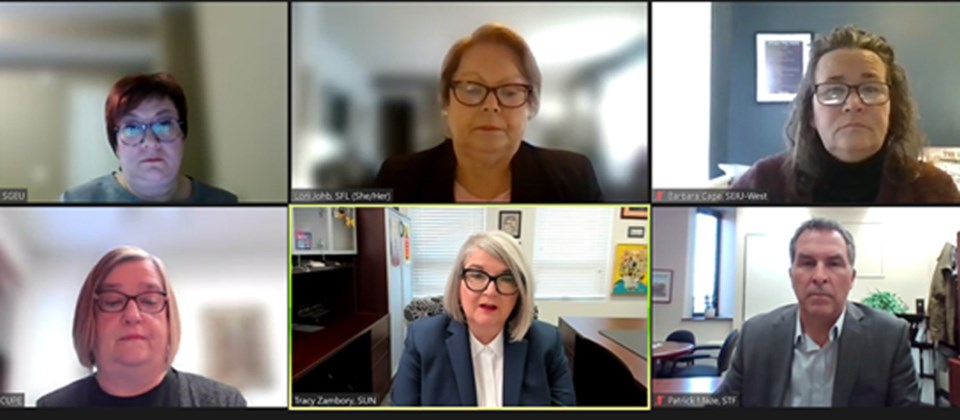SASKATOON — Presidents of Saskatchewan labour unions appealed to the provincial government to address the mounting health crisis brought by the rising cases of the coronavirus Omicron variant, suggesting Premier Scott Moe implement more restrictions to address staff burnout and shortages in the sectors they each represent.
Presidents from the Saskatchewan Federation of Labour, Saskatchewan Union of Nurses, Saskatchewan Teachers Federation, Canadian Union of Public Employees, Saskatchewan Government and General Employees Union and Service Employees International Union-West voiced their concerns on the provincial government’s response to the fifth wave of the pandemic.
SFL head Lori Johb was joined by SUN’s Tracy Zambory, Patrick Maze of STF, CUPE’s Judy Henley, Tracey Sauer of SGEU and SEIU-West’s Barbara Cape for a joint Zoom media conference Thursday. Together their unions represent 113,000 members of the workforce in the province, most of whom are frontline workers in areas such as health care and schools.
They were united in saying that currently the provincial government has no concrete plan to address staff shortages and the burnout felt by their personnel, who are still able to work, adding that Moe’s decision to resist bringing back health restrictions to control the spread of the Omicron variant is a form of giving up.
They called on Moe to follow the recommendations made by Saskatchewan’s chief medical officer Dr. Saqib Shahab after the rise in COVID-19 cases led to hospitals being overwhelmed by patients who needed treatment. Since after the Christmas break, COVID-19 cases in Saskatchewan continue to rise at an alarming rate, the unions say.
Shahab, during a news conference last week, recommended a limit to gathering of 10 people. He also suggested establishing a consistent bubble, reduce non-school and non-work gatherings, and cut down non-essential travel between communities.
“We are asking for the government to listen and to implement these recommendations as public health orders before the situation gets worse. Right now, the failure to implement any orders at all is leading to rapid community spread that is putting unprecedented strain on services Saskatchewan citizens rely on every day including health care, education and community-based supports,” said Johb.
She added all six unions have been flooded by numerous calls from their members who continue to do their jobs despite the ongoing pandemic and experience firsthand the impact of the lack in public health measures.
“Across sectors, these frontline workers report burnout and staffing shortages. They are operating in crisis mode and the systems are not functioning as intended or designed, creating significant safety concerns. We are urging Premier Moe to act in the interest of protecting our health, safety and access to vital services.”
Zambory said she feels the pressure and stress of her fellow registered nurses in the last two years of the ongoing pandemic as her union is in the thick of things in patient care and the fight against the virus. Now, they are dealing with a sudden surge of the Omicron variant.
“Saskatchewan’s understaffed health services are being further strained and some members are saying they are stretched too thin to provide safe, high-quality care our patients depend on and we are still weeks away from Omicron’s peak. Our rural health care facilities are closed or operating at reduced levels,” said Zambory.
“Our city’s emergency rooms are filled to the rafters. We have neither the space [nor] the staff to continue at this pace and things are likely to get worse. The Government of Saskatchewan must act decisively and proactively to protect Saskatchewan’s people and our crumbling health care system.
She added the unions have been keeping the province open throughout the pandemic and the selfishness and heroic acts of the more than 113,000 workers deserve gratitude and protection from the provincial government.
STF president Patrick Maze said he joins his colleagues in appealing to the government to take action and change the way they have been addressing the pandemic as the daily lives of students, teachers and staff depend on it.
“In the first time since we began raising our concerns about government's inaction to address this Omicron wave, the situation has predictably gotten worse. As a member recently stated to us, teachers are brave and student-focused, and they have been since day one. Teachers and other frontline workers who are here today asking for action have been shouldering the weight of this pandemic. Teachers, principals, school district personnel continue to do a truly heroic job with the tools that they have to keep their students and colleagues safe,” said Maze.
Omicron infections, however, crept through schools with teachers and other support personnel getting infected by the virus that led to shortages.
“The STF position has been, and it continues to be, that in-class learning is what is best for students and should be prioritized and made safe for everyone. When there is rampant community spread as we are seeing now, it is impossible to keep that from impacting our schools and student learning. This is already true for some of our schools where they've been forced to move to online learning to address staffing issues, and unmanageable case numbers,” said Maze.
“Thankfully, substitute teachers are playing a vital role in keeping schools open, but there aren't enough to provide coverage. Some schools have had to find non-instructional and unqualified staff to simply offer supervision due to the shortage of substitutes. The impact is that students are quickly losing access to consistent quality education. Students, families and our teachers deserve so much better. We know what measures and protections we can take to limit the impact of this wave.”




